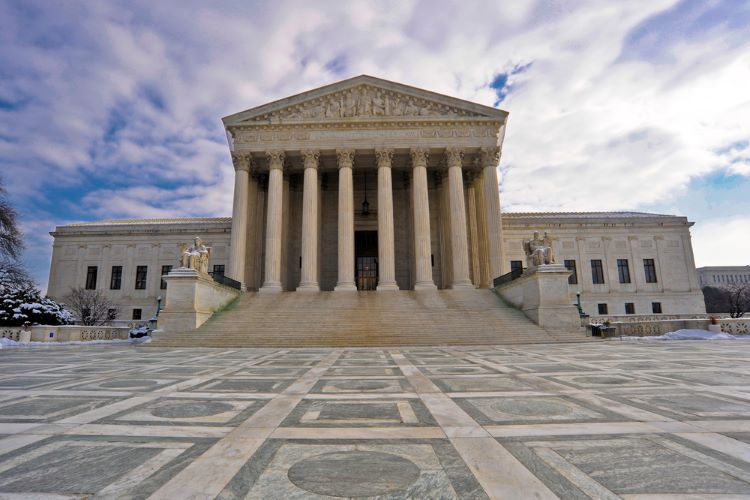Contraceptive mandate is overturned for closely held companies with religious objections

Image from Shutterstock.
The U.S. Supreme Court has ruled 5-4 that closely held corporations can’t be required to provide insurance coverage for contraceptives over their owners’ religious objections.
The contraceptive mandate, enacted as part of the Obama administration’s health-care law, violates the private companies’ rights under the Religious Freedom Restoration Act, the court majority said in an opinion (PDF) issued on Monday. The court did not reach First Amendment issues in the case.
RFRA bars the government from taking actions that substantially burden the exercise of religion unless the action constitutes the least restrictive means of serving a compelling government interest.
Justice Samuel A. Alito Jr. wrote the majority opinion. A concurring opinion by Justice Anthony M. Kennedy stressed that the government could still pay for contraceptive coverage when the employer does not provide it.
Contraception is among the preventive services that employee health plans must provide under the Affordable Care Act. The law exempted religious organizations but not for-profit companies. The closely held companies that challenged the law are Hobby Lobby, owned by a family that believes life begins at conception, and Conestoga Wood Specialties, owned by a Mennonite family.
The owners of Hobby Lobby and Conestoga Wood Specialties did not forfeit RFRA protections when they organized as corporations rather than sole proprietorships or general partnerships, Alito said. The government did have a less restrictive means of making contraceptive coverage available to employees of these companies, Alito said—under an exemption that already applies to religious nonprofits. The exemption puts the cost burden on insurers rather than the entities with religious objections.
Alito stressed that the decision is confined to the issue of the contraceptive mandate. “Other coverage requirements, such as immunizations, may be supported by different interests (for example, the need to combat the spread of infectious diseases) and may involve different arguments about the least restrictive means of providing them,” Alito said.
Alito also knocked down a suggestion in the dissent that companies could use religion to justify discrimination. “Our decision today provides no such shield,” he said.
Justice Ruth Bader Ginsburg wrote a dissenting opinion joined in full by Justice Sonia Sotomayor. Justices Stephen G. Breyer and Elena Kagan joined the dissent except for a section saying for-profit companies are not governed by RFRA.
“In a decision of startling breadth,” Ginsburg wrote in the first paragraph of her dissent, “the court holds that commercial enterprises, including corporations, along with partnerships and sole proprietorships, can opt out of any law (saving only tax laws) they judge incompatible with their sincerely held religious beliefs.” She warned of “the havoc the court’s judgment can produce.”
“Until this litigation,” Ginsburg wrote in a section joined by Sotomayor, “no decision of this court recognized a for-profit corporation’s qualification for a religious exemption from a generally applicable law, whether under the free exercise clause or RFRA.”
Kagan and Breyer said they didn’t need to decide whether RFRA applies to for-profit corporations to find that the challenge to the contraceptive requirement fails on the merits.
Tom Goldstein, founder of SCOTUSblog, noted the limits on the court’s holding. “The court makes clear that the government can provide coverage to the female employees,” Goldstein writes. “And it strongly suggests it would reject broad religious claims to, for example, discriminate against gay employees.”
The cases are Burwell v. Hobby Lobby Stores Inc. and Conestoga Wood Specialties Corp. v. Burwell.
Prior coverage:
ABAJournal.com: “Justices appear ready to accept that some corporations can assert religious freedoms under RFRA”
ABAJournal.com: “Chemerinsky: Corporations, contraception and religious freedom”
ABA Journal: “Companies claim contraceptive mandate goes against owners’ religious beliefs”
ABAJournal.com: “Contraceptive-coverage mandate will be reviewed by Supreme Court”



